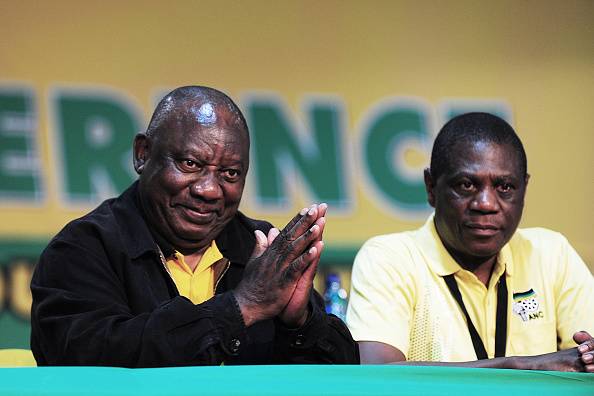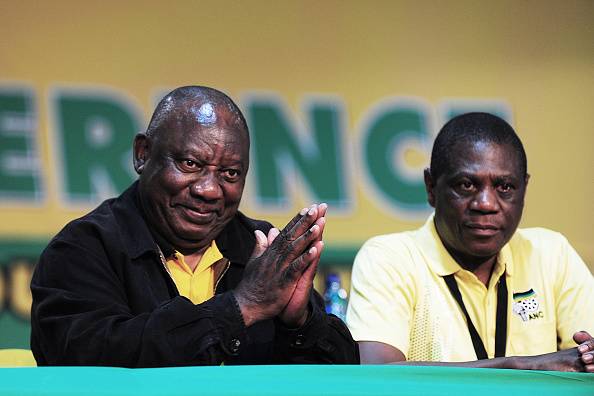

There has only been one real winner of South Africa’s elections since 1994. And it has not been the ANC, or any of the other political parties contesting the elections.
International and local Big Business — the minerals and energy complex — has won every election since democracy without even being on the ballot.
Political soothsayers who claim to be radical, from Economic Freedom Fighters leader Julius Malema to former president Jacob Zuma, are radical only in rhetoric and theatre and not in deed and policy. Just as every US presidential candidate must “kiss the ring” of the American Israel Public Affairs Committee, so too must the South African politician with the potential of radicalising the thinking of South Africans about the economy go to London and New York to “bend the knee” and promise that nothing will change.
Yes, even the loudmouthed and brash Malema and his lieutenants went to London to reassure international capital that his party would not threaten business.
After Zuma was elected as ANC president in 2007, the first thing he did was take a trip to London to reassure international investors and capitalists that he did not intend to change South Africa’s macroeconomic policy.
In fairness, though, we must understand history and the consequences when we try to take on Big Business. We must note that our minerals and energy complex economy remains a colonial economy, with the owners of the economy, whether South African or not, with loyalties in the West, particularly the US and the UK. Therefore, international capital and local big business are inextricably conjoined.
But getting back to an appreciation of history. The power of capital and the markets should not be underestimated. If you pick a fight with them, be prepared to die with your boots on. Capital has a lot more weapons and resources at its disposal than you may realise.
A classic example of the power of capital is France. When the French in 1981 elected socialist François Mitterrand as their president, the economy was severely punished. This was at the height of the Cold War and you would have expected that the leaders of France — a veto-wielding permanent member of the United Nations Security Council, a nuclear power, a part of old Western European money and a certified member of the West — would at least have been be able to exact considerations from Western capital, which should have been fearful of the Soviet Union taking advantage of the French swing to the political left.
But the opposite occurred. France was on its own. Samuel Bowles and Herbert Gintis wrote in a New York Times article in 1986 that from 1965 to 1981, the US had invested directly into France at an annual rate of 11%, but with the election of Mitterrand in 1981, US direct investment fell annually by an average rate of 9% a year.
Bowles and Gintis further elaborated that other investors also reduced investment, which had a direct effect on France’s productive capacity.
The result of this investment strike was that the French government abandoned its socialist economic programme, opting for an austerity one, and in the next election, conservative Jacques Chirac was elected president.
As endowed as the South African economy is with its diversity of minerals, advanced industrial capability, developed financial and banking industry, as well as vast numbers of human capital, no one can claim that we have an economy as large and as developed as the French.
So what is it that we can do? Or are we simply supposed to accept that this is our lot in life, to vote for change and expect that nothing will change? The answer lies in what our minister of finance, Enoch Godongwana, is reported to have said at the capitalist citadel of the World Economic Forum in Davos, Switzerland.
In a panel on Brics, BusinessTech reports that Godongwana said: “Our economies, particularly South Africa, have been heavily dependent on the West, so a delinking for us is critical, in other words, changing trading patterns.”
Our finance minister is correct that our country cannot remain dependent on Western trade. But that should not mean we swop the West for the East. Recall that Zimbabwe’s Robert Mugabe, in attempting to delink the economy from the US and Great Britain, came up with his ill-fated “Look East” programme, which failed. South Africa must not follow suit.
The Mitterrand example helps us to understand that if economic growth is dependent on external investment, then growth and the overall stability of the country will always be dependent on factors and players outside of the country’s control.
Rather, foreign investment should be attracted to South Africa’s economy because there is increased domestic investment in the economy; foreign direct investment should be the cherry on top, not the raison d’etre.
If we are to take Godongwana at his word in an election year, then can we really expect a change in the macroeconomic strategy of our country?
And I ask that with all honesty, because every government since 1994, and even rising political opposition parties, have always kissed the ring of capital, and promised not to touch the macroeconomic strategy of trying to attract international investment so as to grow the economy.
If there was going to be a change or a delinking, as Godongwana said, it cannot be that we swop the West for the East. Rather we would expect the government to have expansionary budgets and regulate South African capital so that it does not hoard profit, but is forced to invest it and not be allowed to remove it from the country.
We would expect that economic growth would not be dependent on international investment but more focused on the government and established business investing in local businesses and entrepreneurs, particularly small black business, and in that way that will grow the economy and thereafter attract international investment.
Recently we all witnessed South Africa swim against the tide and take on Israel in the International Court of Justice. It did this under obvious objection from the US, the UK and many other major international investors in our economy. It did it for the correct reasons.
I have in the past commended the South African government and the ANC. I have asked whether the ANC has rediscovered itself and its radical nature, where it places principles, values, morality and integrity above strategy and pragmatism.
None of the major political parties want to change a macroeconomic strategy even though that strategy increases unemployment, reinforces apartheid spatial inequalities and strips our people, especially poor black people, of their dignity.
The government and the ANC can take the bull by its horns and lead the change of this failing macroeconomic strategy just as it took on the powerful countries over Palestine.
Successive ANC national conferences have passed many resolutions calling for this change, such as buying out the private shareholders of the South African Reserve Bank, so that we expand, without apology, the mandate and task of the central bank. (By the way, the shares in the hands of private shareholders are worth only R20 million, not billions.)
In essence, the ANC must focus on the people and their needs, not foreign direct investment. It should not punish domestic capital, but remind it that since 1994 the government has had investor-friendly policies, despite the bureaucratic administrative burdens, yet business has chosen not to invest in any meaningful way, and the ANC will not allow this to continue. If this happens, then there will be real reasons for international capital, in both the East and the West, to want to invest. And the 2024 election will also be the proverbial cake-walk.
Donovan E Williams is a social commentator.
The government must focus on the needs of the people and not only on minerals and energy



